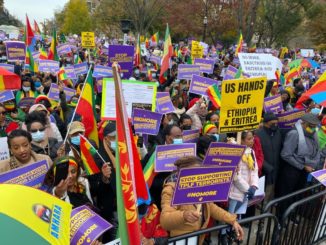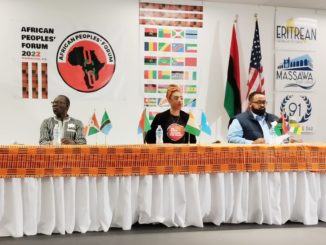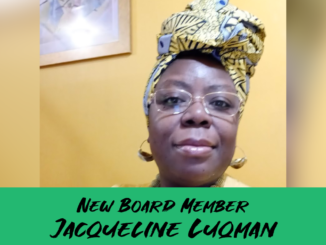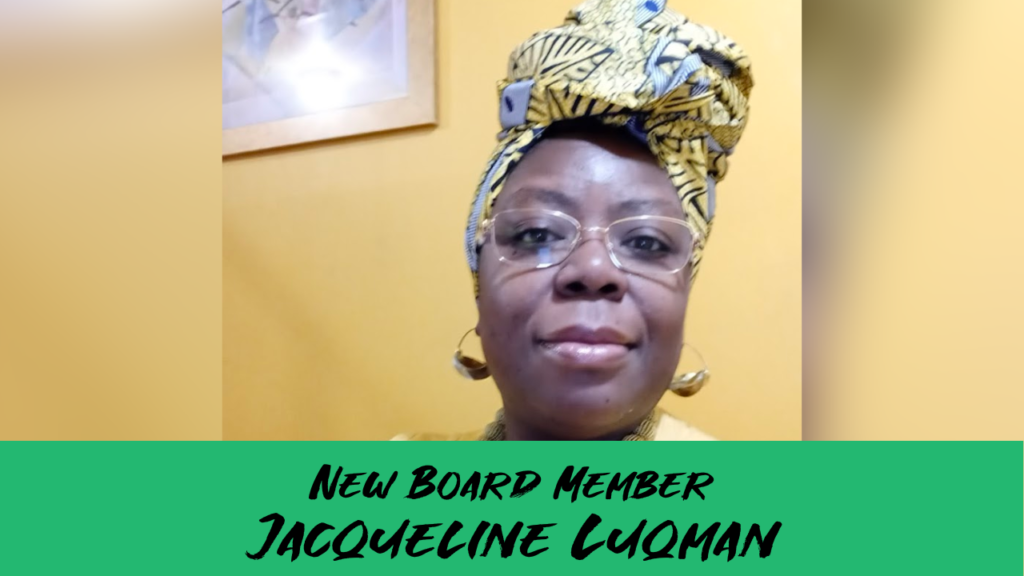Nigerian journalist Chido Onumah spoke to Peoples Dispatch about the country’s new president, Bola Tinubu. He explained the controversy in Tinubu announcing an end to fuel subsidies. Chido also explained the agenda of the new president and the political climate in the country following the controversial election.
Related Articles
Related Articles

How the Left Can Get Ethiopia Right: The Good, the Bad and the Ugly with #NoMore

Editor’s Note: The following is the writer’s opinion and was first published in Black Agenda Report.
Correction: A previous version of this article erroneously connected Lausan Collective to the National Endowment for Democracy (NED). A member of Lausan Collective had served as a fellow at the Taiwan Foundation for Democracy, an organization that has collaborated with the NED.
In the last few months, the left media outlets from various camps, in their sincere attempts to demonstrate solidarity and spotlight conflict in the Horn of Africa and internal developments in Ethiopia, got it wrong. They have been uncritically centering active ideological players on two opposing camps. The significant focus on the Tigray People’s Liberation Front (TPLF) attacks on Eritrea, its invasion of Afar and the Amhara region, and its existence as a willing proxy actor of Washington was correct. They got it wrong, however, in their uncritical framing of neoliberal Ethiopian President Abiy Ahmed. They have chosen to over-amplify the Abiy camp’s reactionary narrative on the long ideological internal struggle concerning the path forward for Ethiopia and the Horn.
In 1915, Lenin gracefully asserted:
“We demand freedom of self-determination, i.e., independence, i.e., freedom of secession for the oppressed nations, not because we have dreamt of splitting up the country economically, or of the ideal of small states, but, on the contrary, because we want large states and the closer unity and even fusion of nations, only on a truly democratic, truly internationalist basis, which is inconceivable without the freedom to secede.”
It is in the same framework that the principled Ethiopian and Eritrean revolutionaries during the 1960 and 70s warmly embraced this materialist line on the National Question. One of the most noted and often quoted Ethiopian Marxist is Wallelign Mekonnen. Mekonnen, who is of Amhara background, is famous for this 1969 article, “On the Question of Nationalities in Ethiopia.” This article is very relevant for today, and offers an effective ideological compass to navigate around the war of narratives taking shape, particularly on social media. Mekonnen specifies the basis of the Ethiopian settler state and its class foundation, which operated to benefit the Abyssinian ruling class in both Amhara and Tigray regions. The oppressed nations were not Amhara or those in the Tigray region, but the other non-Abyssinian nations in the south, who were conquered, colonized, and their names erased for the creation of Ethiopia. Mekonnen writes:
“To anybody who has got a nodding acquaintance with Marxism, culture is nothing more than the superstructure of an economic basis. So cultural domination always presupposes economic subjugation. A clear example of economic subjugation would be the Amhara and to a certain extent Tigray Neftegna system in the South and the Amhara Tigray Coalition in the urban areas. The usual pseudo-refutation of this analysis is the reference to the large Amhara and Tigray masses wallowing in poverty in the countryside.”
Following Mekonnen, I argue that the left must cautiously navigate around the two opposing ideological battlegrounds that have co-opted the language and performativity of “anti-imperialism” or “decolonization.” This language works to impede wider radical investigation of the Horn of Africa and its various contradictions.
As Lenin and the elder Eritrean and Ethiopian revolutionaries from the 1960 and 1970s advocated a dialectical understanding of the National Question, so must the left as they seek to understand Ethiopia and the Horn. What is the national question of Ethiopia? Voices from the revolutionary Ethiopian student movement of the 1960s and 1970s echoed much of V. I. Lenin’s point on the National Question that nation-states should be based on “voluntary ties, never compulsory ties.” Lenin insisted upon the “right of every nation to political self-determination,” which includes the right to secession. Following Lenin, Tilahun Takele (pseudonym name for a member of the Ethiopian People’s Revolutionary Party (EPRP)), argued:
“How could Marx, Engels, Lenin and Stalin, of all people support the right of nations to secession when they were, on the other hand, the most committed advocates of the unity and integration of the world proletariat? The answer is simple. Briefly, it is precisely because they wanted to promote the genuine, equality and fraternal unity of the proletariat of all nations, the general unity of the oppressed toiling masses of all nations.”
What are examples of the two opposing voices on The National Question that are attempting to get leftist legitimacy and credibility online? The first example uses the facade of decolonial positioning to cover for the attempted imperialist intervention against Ethiopia and also absolve TPLF of its violent aims to continue the settler-colonial legacy of Abyssinian king Yohaness of Tigray. The second one gives cover to neoliberal Abiy’s vision, a vision that aims to continue the settler-colonial legacy of Abyssinian king Menelik of Amhara without addressing the grievances of the oppressed nationalities.
We can see an example of the first camp in a popular event that occurred on December 8, 2021. Haymarket hosted a webinar called, “What’s Happening in Ethiopia,” with panelists Ayantu Tibeso and J. Khadijah Abdurahman, and facilitated by an anti-China Hong Kong “leftist,” Promise Li, who is a member of Lausan Collective.
Haymarket attracts pro-TPLF academics, such as Andom Ghebreghiorgis, with similar pro-Amnesty International politics and NED connections. One of the panelists referenced Wallelign Mekonnen by aiming to manipulate the “Nations and Nationalities” discussion toward vilifying the Amharas and the Eritrean state, while simultaneously giving cover to the Washington-backed TPLF as the vanguard of the oppressed nationalities. In other words, the discussion was intellectually dishonest, both in its inability to acknowledge Ethiopia as a settler state that has primarily benefited the Amhara and Tigray ruling classes, and in its echoing the U.S. State Department propaganda that is running interference for the TPLF while demonizing the Eritrean state.
An example of the second ideological camp can be seen at an event that occurred on September 11, 2021. The People’s Forum NYC hosted a webinar on “Imperialism, Ethiopia & Conflict in the Horn of Africa,” with panelists Simon Tesfamariam and Elias Amare, who are part of the People’s Front for Democracy and Justice (PFDJ) camp and co-leading the #NoMore social media campaign. Simon and Elias echoed the usual Abyssinian pejorative slur of “Ethnic Federalism” and discredited the Nations and Nationalities argument by attributing it to “tribalism,” and saying that “tribalism is a problem throughout Africa.” The term “ethnic federalism” is not one of facts to the current Ethiopian constitution as there is no ethnic federalism but mult-national federalism in name, which has not been implemented during the last 28 years under the TPLF regime and now under Abiy as well. They also ridiculed the radical assertion around Nations and Nationalities, equating anyone that supports that line with being a “tribalist.” In the same vein, Tesfamariam attempted to discredit the voices who put critical anti-colonial framing on the formation of Ethiopia, which challenges the mythological narrative of a 3,000-year-old independent Christian African state. Further, on his Twitter account, Tesfamariam deployed Abyssinian slurs “ethnofascist” and “tribalists” to de-legitimize the historical grievances of the oppressed nationalities.
Why are Eritreans like Simon Tesfamariam and Elias Amare, who support the People’s Front for Democracy and Justice (PFDJ), so keen on dismissing the real struggles of oppressed nationalities in Ethiopia, a position that is in contradiction to the spirit of the Eritrean revolution? Under the direction of Isaias Afwerki, the PFDJ has taken a line of concentrating on the primary contradictions, which is imperialism and the management of the region via proxy actors like TPLF. In fact, for the past 18 years, the Eritrean state had been the home of oppressed nationalities’ liberation fronts (OLF, ONLF, etc) struggling against the Washington-backed TPLF regime. However, after the 2018 peace deal, and after the re-igniting of war in the region in 2020 by the TPLF, the rhetoric in support of the oppressed nationalities has been abandoned.
The Good, the Bad and the Ugly with #NoMore
“We have the Marxist-Leninist weapon of criticism and self-criticism. We can get rid of a bad style and keep the good.” -Mao Zedong
How did the #NoMore form online and what is the social, political and class structure behind it? The #NoMore campaign is an online diaspora projection or formalization involving the PFDJ in Eritrea and the Amhara region, plus Abiy Ahmed in Addis Ababa, in political alliance against the TPLF. The sporadic social media campaign came at a time during the violent occupation of the Amhara region as TPLF was making gains militarily and attempting to advance to Addis Ababa. The Twitter accounts that support the campaign are led by the three dominant ethnic and political bases in both Eritrea and Ethiopia, represented by Hermela Aregawi (Tigraya), Simon Tesfamariam (Tigrinya) and Nebiyu Asfaw (Amhara). The #NoMore campaigns and protests have attracted very large crowds in the United States. But the large crowd is primarily Amhara because this is the main group that forms the Ethiopian diaspora in North America. The Amhara population also numbers 20 million in Ethiopia, and are the second largest group after the Oromos, who number over 40 million people.
Despite the claim to represent all of Ethiopia, the Oromos and other historically marginalized groups are hardly part of the social media campaign. The same can be said with all of the Eritreans and Somalis. Both the Amhara and Tigrayans, due to their dominant grip of Ethiopia over the century, enjoy the settler-colonial privilege with scholarships, visas and aid to live in the diaspora. This is the reason why they are the dominant voices of what we call “Ethiopia”—online and offline.
The good aspect of the #NoMore campaign is that it is significant to witness Eritreans and Ethiopians engaging each other and sharing a common struggle. That itself is historic. That the campaign focused on the crimes of the TPLF on Eritrea, Amhara and Afar region is the best thing about it. What is problematic is the shifty co-option of “anti-imperialist” rhetoric. While the leaders of the #NoMore campaign are vehemently critical of Washington’s foreign policy, if at least temporarily, their opposition seem to only demand that the leaders Isaias Afwerki and Abiy Ahmed have a seat at the table—presumably with the imperialists. They should be calling, instead, for the destruction of the table.
The bad aspect of the #NoMore campaign is its deployment of reactionary rhetoric and symbolism: The foregrounding of the imperial Abyssinia flag, the exaltation of feudal Abyssinian monarchs, the romanticization of the “Battle of Adwa” and the pushing of the propaganda that “Ethiopia is 3,000-year-old independent state.” This social media campaign has alienated the Oromos and other marginalized communities.
The ugly is that the National Question—the goal of decolonizing the settler-state of Ethiopia, and the overall need for a wider class struggle of the masses in the Horn of Africa—has taken a back seat in the #NoMore campaign. In fact, the articulated electoral strategy of “Vote Republican” should demonstrate that this is not a sincere anti-imperialist campaign.
How Can the Left Get It Right?
It is important for Western leftists to focus on imperialism and not take a hardline position on the internal politics of Ethiopia by not being sensitive to all the contradictions. The PFDJ is able to recognize the primary contradiction being the imperialist lackey, TPLF, in Ethiopia, but fails to recognize the other internal contradictions (the National Question). This is where the TPLF has a lifeline. For the PFDJ to not acknowledge the secondary contradiction is also to not have the correct analysis on the ways that the Abyssinian ruling class exploits these contradictions to further their settler-colonial agenda. These secondary contradictions are weaponized to exacerbate the primary contradiction. We see, for example, how the TPLF is using the plight of the oppressed nationalities to mask their settler-colonial ambitions. PFDJ representatives dismiss the oppressed nationalities as just “tribalists” and “ethnofascists,” a move that alienates the historically oppressed nationalities.
Failure to actively engage the contradictions of the National Question also gives legitimacy to Abiy, who, in addition to espousing more neoliberal policies than TPLF, has denied the historical grievances of Oromos and others in Ethiopia.
The left should oppose imperialism, but without ignoring the Ethiopian National Question. Tigray was never a part of the oppressed nationalities, but benefited from the fruits of settler colonialism. Tigray region’s political struggle with the Amhara region dates back to the period of Ethiopia’s creation in the late 1800s. The ideological struggle in the present is over who is to be the face of the Ethiopian settler-colonial state.
The left or anti-colonial forces in the past also got it wrong when they gave solidarity to slave-owning Menelik with the “Battle of Adwa,” legitimizing the conquest of the oppressed nationalities; to Selassie during the fascist Italian invasion of Ethiopia by helping to restore his feudal rule; to the pseudo-Marxist Derg regime, which hijacked the revolutionary momentum in Ethiopia; and to Meles Zenawi under the banner of state developmentalism.
The modern left must not make the same historical mistake in not being sensitive to the decolonial question of Ethiopia.
The left must heed to words of the Eritrean and Ethiopian revolutionaries of the 1960s and ’70s. One noted Ethiopian voice from that time is Tilahun Takele, who stated: “We believe that the recognition and support of the right of secession by revolutionary Ethiopians, especially those from the dominant nations, will foster trust and fraternity among the various nationalities.”
Filmon Zerai is an independent blogger who provides leftist commentary on the Horn of Africa. His views have appeared on CapeTalk, Sputnik International, BBC and other outlets. Zerai also is the founder and producer of the Horn of Africa Leftists podcast.

‘U.S.-Africa: How the Peoples’ Struggles Connect’: Second Panel of African People’s Forum
Editor’s Note: This panel discussion was produced by the African Peoples’ Forum.
Paul Sankara, consultant, activist and brother of assassinated Burkina Faso leader Thomas Sankara; Eugene Puryear, community organizer and host at BreakThrough News; Erica Caines, a Black Alliance for Peace Coordinating Committee member, co-editor of Hood Communist and founder of Liberation Through Reading; and Nebiyu Asfaw, co-founder of both the Ethiopian American Development Council and the #NoMore Movement discussed connecting African peoples’ struggles across the continents at the first-ever African Peoples’ Forum. The event was held December 11 at the Eritrean Civic & Cultural Center in Washington, D.C. Journalist Hermela Aregawi and activist Yolian Ogbu moderated.
The first panel can be viewed here.
TF editor Julie Varughese reported on this event being held to counter the Biden administration’s U.S.-Africa Leaders Summit.

Bringing Together Activism and Journalism: Q&A with Jacqueline Luqman, New Toward Freedom Board Member

Toward Freedom welcomed Jacqueline Luqman onto the board of directors on March 17. Jacqueline brings a background in activism and in journalism, and describes herself as a “Pan-Africanist, anti-capitalist, anti-imperialist revolutionary.” Jacqueline co-hosts the weekday radio show, “By Any Means Necessary,” on Radio Sputnik as well as the weekly Black Power Media show, “Luqman Nation.” She also is the organizer of the Mid-Atlantic Region of the Black Alliance for Peace and is an organizer with Pan-African Community Action. Besides all that, Jacqueline is the moderator and member of the Board of Social Action of the Plymouth Congregational United Church of Christ in Washington, D.C.
Here’s what Jacqueline told Toward Freedom’s editor, Julie Varughese.
What got you interested in joining Toward Freedom’s board of directors?
I enjoyed the content of the publication and particularly like how Toward Freedom incorporates entertainment critique with political commentary.
Your background is in activism and in journalism. How do you reconcile what are normally seen as mutually exclusive endeavors?
Activism is the response to issues being reported in the news that are the result of politics and policies. Activism is the response to the injustice of those politics and policies on communities that have little to no say in how those policies are made. So reporting on the impact of those policies and politics on the people in the streets is a necessary aspect of activism, as it connects people who are doing the work with many who may not know what is even going on.
Tell us about Bruskie.
He is my 10-year-old furbaby. He thinks he is a person. He may be channeling my late husband, Abdus. But he is a complete 100-pound clown and big baby. He also is a very good Protest Dog, except when other people’s dogs are around, and then he forgets that he’s supposed to be Comrade To All Man and Dogkind. He’s working on that.
What is the next big story Toward Freedom should try to pursue?
The impact the war in Ukraine has had on de-prioritizing the U.S. dollar in developing countries in Africa; multi-polar solidarity among Global South and African nations, and in and between working-class movements in those countries; as well as the role of China as the new leader of the multi-polar world and what that means to the international working class.
